Are you currently pregnant and you’ve been told that you’re gaining too much weight?
You’re in the right place.
After reading this post, you’re going to learn:
- How much weight you should gain during your pregnancy
- The reasons why are you gaining so much weight, and
- How to avoid putting on extra pounds.
Let’s get started.
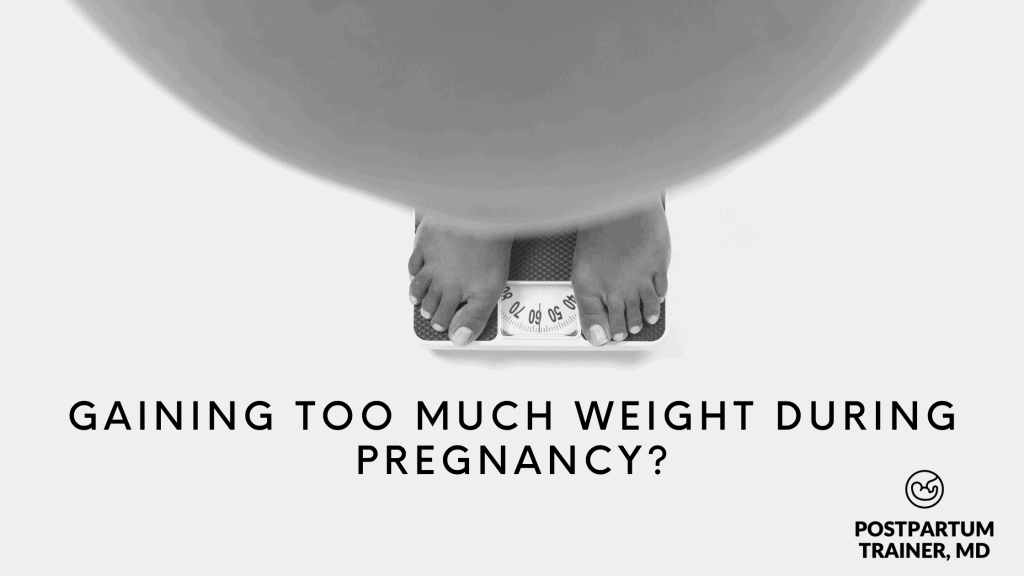
Why am I gaining weight so fast during pregnancy?
The reason why you are gaining weight so fast during pregnancy is because you are consuming too many calories, and too many nutrient-poor foods.
I know you’ve heard it before.
“It’s okay you are pregnant, just eat it.”
While it’s okay to indulge once in a while- constantly giving into cravings will cause you to gain too much weight.
During pregnancy, it is important for you to pay attention to both the quantity and quality of the food you are consuming.
This is one of the most important times of your life.
Your fetus is directly depending on you for everything.
How much is too much weight gain in pregnancy?
Too much weight gain in pregnancy is dependent on your pre-pregnancy body weight. If you had a normal BMI before pregnancy, anything above 35 lbs could be considered “too much weight gain.” If you were overweight or obese, anything above 25 or 20 lbs respectively can be considered too much.
Here’s a simple table showing the CDC recommendations on weight gain during pregnancy.
| >40lbs if you are considered underweight |
| >35lbs if you are considered normal weight |
| >25lbs if you are considered overweight |
| >20lbs if you are considered obese |
Remember the categories are all based on your pre-pregnancy BMI classification.
Can gaining too much weight during pregnancy be bad?
Yes, gaining too much weight during pregnancy can put you at risk of developing numerous pregnancy and postpartum complications including but not limited to:
- Gestational diabetes
- Shoulder dystocia
- High birth weight babies also known as macrosomic infants
- Cesarean section
- Diabetes later on in your child’s life
- Neonatal ICU admission of your newborn
What is considered rapid weight gain?
Rapid weight gain occurs when you exceed the predicted amount of weight you should gain on a weekly basis.
In general, you should gain
- ~5 lbs in your first trimester, and
- ~1 lb per week in the second and third trimester
For example, if you gain 5 lbs in just 1 week of pregnancy, you are experiencing rapid weight gain.
If you are experiencing rapid weight gain you should make an appointment to speak with your provider to ensure there is no underlying complication.
For your information, here are the weight gain recommendations in pounds and kilograms.
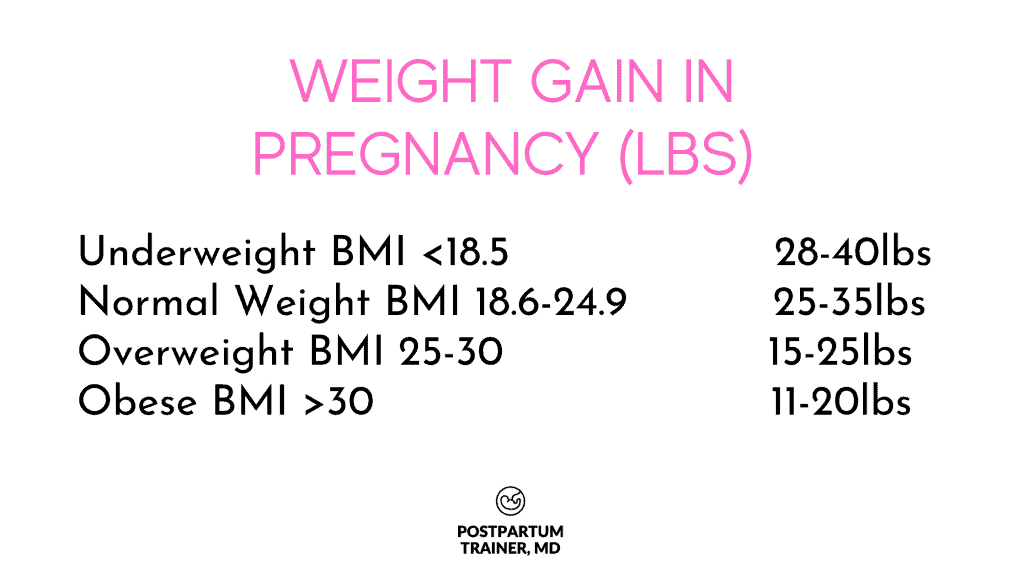
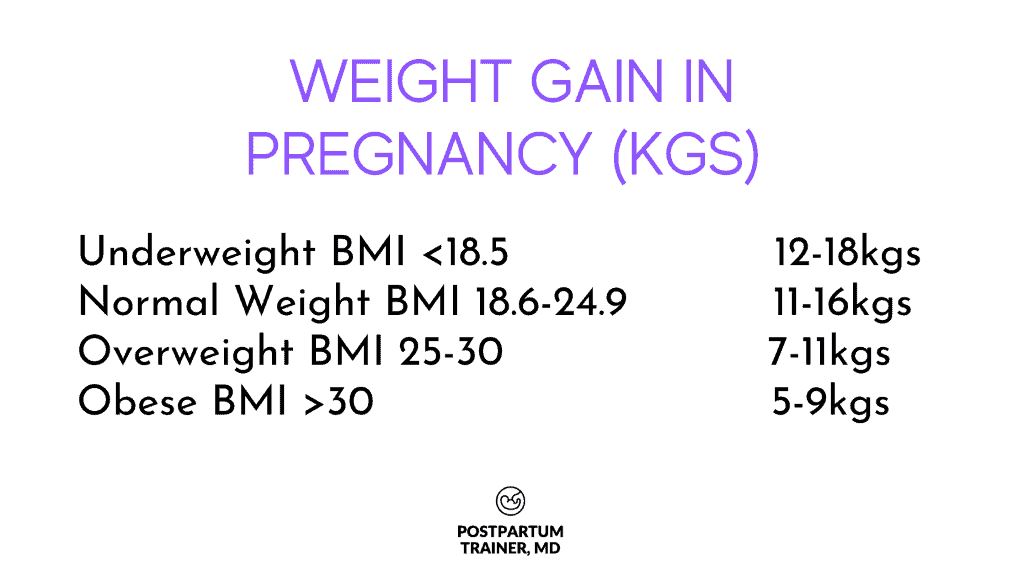
How can I stop gaining weight during pregnancy?
You must determine how much weight you are gaining to determine if you can or should stop gaining weight.
Don’t forget, appropriate weight gain is necessary for your growing baby.
If you speak with your healthcare provider and determine that you are gaining too much weight, you may be placed on a specialized meal plan to control your caloric intake.
In addition it is important to rule out other medical causes of rapid weight gain.
The most common causes of excessive weight gain during pregnancy include:
- Consuming too many calories
- Gestational diabetes
- Preeclampsia (due to excessive swelling)
- Polyhydramnios
- Twin Gestation
Tips for healthy pregnancy weight gain
For health pregnancy weight gain here are four tips you can begin implementing today:
- Avoid liquid calories,
- Minimize your intake of refined carbs,
- Increase your fiber intake, and
- Walk more
Let me explain each one further.
You must avoid liquid calories
Liquid calories (soda, juice, lattes) taste so good and are so easy to over consume.
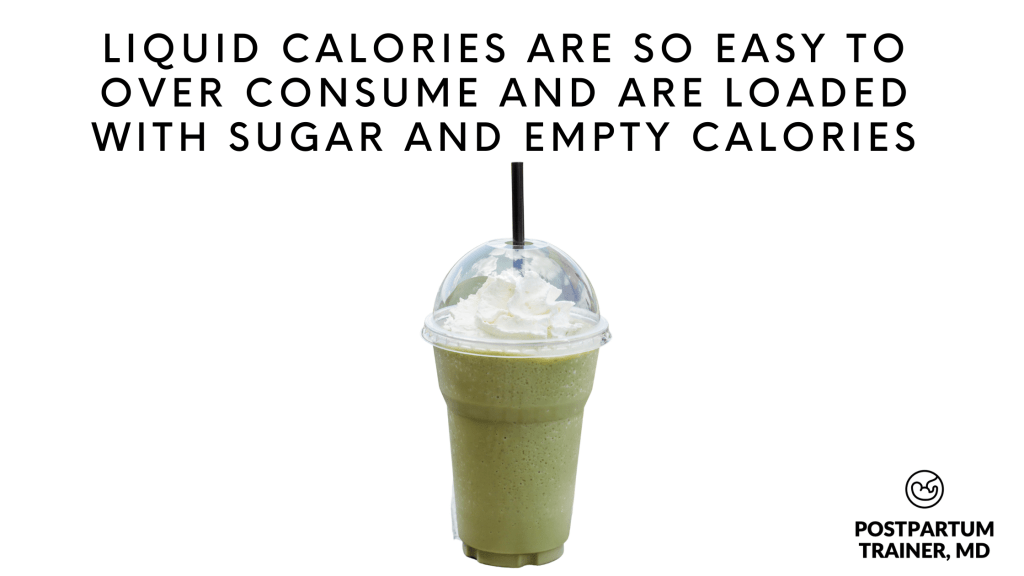
The problem is, they are usually loaded with sugar and empty calories.
Have you ever seen how many calories a Matcha Green Tea from Starbucks has? While it sounds nice and healthy – this one drink can have anywhere from 400-600 calories!
The worst part?
It doesn’t even satisfy your hunger.
So you have to eat even more calories just to be satiated.
So what can you do instead?
Drink zero calorie beverages. This includes water with lemon, unsweetened tea, and black coffee.
Minimize your intake of refined carbohydrates
Another high calorie, low satiating class of food includes refined carbohydrates.
These include foods like:
- White bread,
- White flour,
- White rice,
- Pastries,
- Sweets, etc.
These foods are highly addicting, highly processed and loaded with sugar.
In addition, these foods can spike your blood sugar levels significantly, which you need to avoid, especially if you are at risk of developing gestational diabetes.
Increase your fiber intake
The next important thing for you to do is to increase your intake of foods that WILL keep you satiated.
Fiber is one of the best nutrients to do just that.
Plus, fiber will help prevent constipation – which is quite common in pregnancy as your growing uterus can compress your bowels.
Foods that are high in fiber include:
- Avocados
- Apples
- Beans
- Berries
- Broccoli
- Lentils
- Nuts
- Whole Grains
See if you can add 2-3 of these into your daily diet to replace the refined carbs from above.
Walk more
Lastly, another thing that you can do to help keep weight gain to a minimum is to stay active.
Walking is the most underrated exercise.
It is so easy to do and has so many benefits during pregnancy. It serves as a form of exercise, it helps regulate your blood sugar, it burn calories, and it even improves your muscular strength.
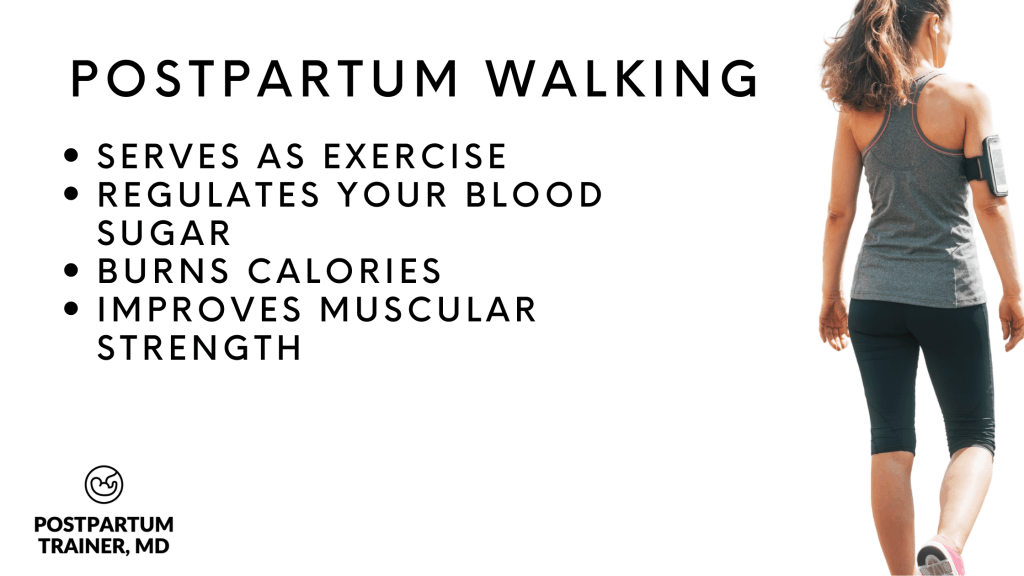
Plus it’s easy to increase or decrease the difficulty of your walking workouts depending on which trimester you are in.
Heck, walking even helps prevent a serious maternal complication known as a deep venous thrombosis (DVT) and pulmonary embolism (PE) which could be life threatening.
If you want to learn more, check out How To Start Walking Exercises During Pregnancy.
Other Related Questions
Why am I gaining so much weight during pregnancy but eating healthy?
If you are eating healthy in pregnancy, but still gaining too much weight, it is important to look at both the quality of food you are consuming, as well as the actual quantity.
You may surprise yourself.
Sometimes, foods that are often thought of as healthy, might not be that healthy at all.
Juice and yogurt are great examples.
Fruit juices can contain anywhere from 40+ grams of sugar and 400+ calories per bottle.
Yogurt could also be loaded with sugar and other calorie-laden ingredients.
Always be sure to read the label!
If you are gaining more than the recommended weight despite eating healthy, you should speak with your doctor to ensure that you do not have a pregnancy complication like diabetes or preeclampsia which could present with weight gain.
What trimester do you gain the most weight?
The second and third trimester is when you will gain the most weight as this is the time during which your baby is rapidly growing.
You can expect to gain anywhere from 0.5-1 lb per week during the 2nd and third trimester.
Here is a table depicting how much weight you should gain during the 2nd and 3rd trimester based on your pre-pregnancy BMI.
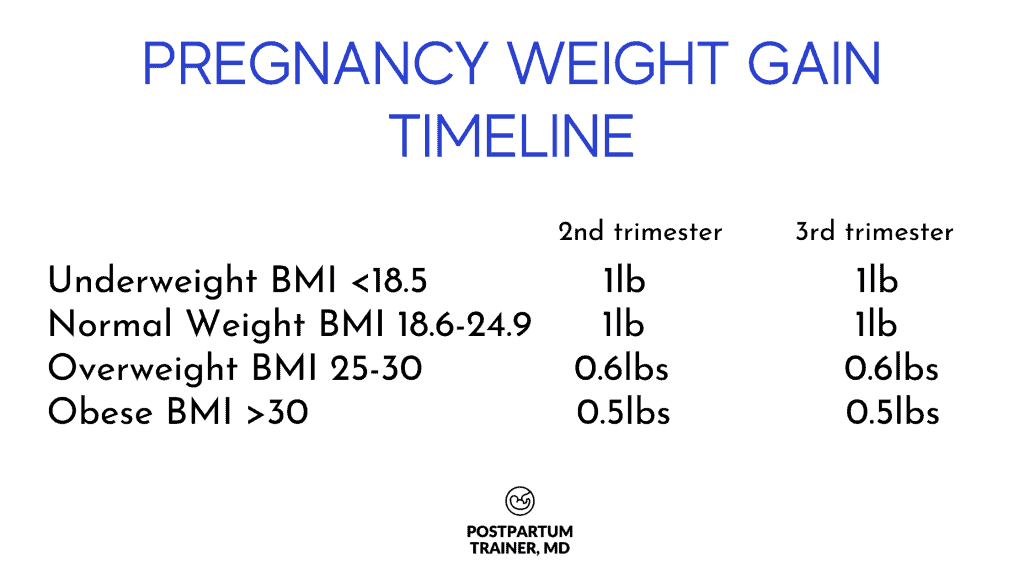
What causes rapid weight gain in first trimester?
Rapid weight gain during the first trimester is almost always caused by an increase in your caloric intake.
Your baby is very small and doesn’t really require additional calories.
Typically you will gain about 1-5 lbs during the first trimester.
Remember, during pregnancy, you never want to “eat for two” as this can cause many pregnancy related complications such as
- gestational diabetes,
- risk of having a large for gestational age baby,
- risk of shoulder dystocia, and
- risk of cesarean section.
What can cause sudden weight gain in the second trimester?
During the second trimester sudden weight gain can be normal or signs of a complication. This can be due to: rapid growth of your baby, an increase in amniotic fluid volume (aka polyhydramnios), or an excessive edema (fluid retention).
Let me go over these in more detail.
Your baby is growing at a more rapid (yet normal) rate
Once you reach the second trimester, you will be gaining weight more rapidly.
This is normal and expected.
It is common to gain approximately 1 lb per week at this time.
However, if you are gaining more weight than this, then it is important that you get an evaluation with your OBGYN.
There is an increase in amniotic fluid
Amniotic fluid is important for the growth and development of your baby. Without it, your baby’s lungs would never develop.
Fun fact: Amniotic fluid is your baby’s urine!
Now, it is totally possible to have too much amniotic fluid.
Too much fluid, (aka polyhydramanios) could signify a pregnancy complication like gestational diabetes.
If you have polyhydramnios, you will be undergoing very close monitoring.
You have an increase in blood volume
During pregnancy your blood volume (aka the amount of blood/fluid circulating in your arteries/veins) increases by about 50%!

This increase in blood is physiologic – as your body will lose a decent amount of blood when you deliver.
It is normal to lose about 300-500cc of blood after an uncomplicated vaginal delivery and about 800-1000cc of blood after an uncomplicated cesarean section.
But at the same time, you might also notice some of this fluid accumulating in your extremities. Excessive fluid retention (aka edema) can sometimes be seen in conditions like preeclampsia.
If you begin noticing excessive swelling and weight gain, make sure to see your doctor regularly for blood pressure checks.
Can you lose fat while pregnant?
It is not recommend that you lose fat while pregnant, especially if you were underweight or normal weight prior to your pregnancy.
If you were significantly overweight, with a BMI >30, prior to the start of your pregnancy you may be able to lose fat, but this is risky.
With that said, it is important for you to speak with your obstetrician and nutritionist before attempting any sort of diet/fat loss program during pregnancy, as any significant weight loss can potentially cause complications.
To learn more, check out my post on How To Lose Fat While Pregnant.
Final Words On Excessive Weight Gain In Pregnancy
Are you feeling depressed about weight gain during pregnancy?
You are not alone!
Thankfully, you can begin to make healthy changes to your nutrition starting today! Speak with your medical provider for more personalized information.
Now I want to hear from you.
What was your pregnancy weight gain experience like?
Did you find you were eating more than you needed?
Comment below and let me know.
Related articles on gaining weight in pregnancy
- How to Gain Minimal Weight While Pregnant [Safely & Effectively]
- The Fit Pregnancy Meal Plan [A Healthy Guide For Soon To Be Moms]
- Can You Lose Fat During Pregnancy? [Everything You Need To Know]
Get Four Free Workouts To Help Strengthen Your Pelvic Floor & Heal Your Mommy Tummy!

Brittany Robles, MD, MPH, CPT
Brittany Robles is a full-time OBGYN physician, a NASM certified trainer, and a prenatal and postnatal fitness specialist. She holds a Master of Public Health degree in maternal health with a special interest in exercise and nutrition. She is also the co-author of The White Coat Trainer. Learn more about her here.
Sharing is Caring – Send This To A Mom In Need!
